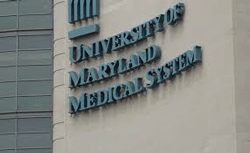 ALL EASTERN SHORE HOSPITALS NOW CONNECTED FOR REMOTE INTENSIVE CARE UNIT MONITORING BY UNIVERSITY OF MARYLAND eCARE
ALL EASTERN SHORE HOSPITALS NOW CONNECTED FOR REMOTE INTENSIVE CARE UNIT MONITORING BY UNIVERSITY OF MARYLAND eCARE
University of Maryland Medical System Now Providing ‘Virtual Safety Net’ to ICU Patients in Nine Maryland Hospitals
BALTIMORE, Feb 5, 2014 — The University of Maryland Medical System (UMMS) today announced the addition of all three University of Maryland Shore Regional Health hospital intensive care units (ICU) to its University of Maryland eCare service, bringing the total hospitals served by expert remote ICU monitoring to nine across the state. By adding this service at UM Shore Medical Centers at Chestertown, Dorchester and Easton, UMMS intensivists can now help direct care for up to 100 ICU patients who are able to stay closer to home. With the addition of the three Mid-Shore medical centers, University of Maryland eCare services are now provided in all hospitals with ICUs on the Eastern Shore of Maryland.
From a central operations hub on the University of Maryland Medical Center (UMMC) campus in Baltimore, telemedicine technology allows intensivists and critical care nurses to oversee patient care in off-site ICUs during the night and weekend hours, providing a virtual safety net for smaller facilities when the local physician staffing levels are lower. The local staff can also get immediate consultation from a critical care expert who is able to see the patient and their real-time medical data through cameras and live feeds of data.
“University of Maryland eCare exemplifies one of our core strategies in the University of Maryland Medical System — to make sure we have the right patient in the right place at the right time,” says Robert A. Chrencik, president and chief executive officer of UMMS. “University of Maryland eCare allows us to extend our expertise in time-sensitive critical care medicine to rural areas, without bringing the patient to Baltimore unless absolutely necessary, easing the burden on patients and their families, and potentially lowering healthcare costs.”
University of Maryland eCare uses special cameras in patient rooms along with continual electronic feeds of information such as patients’ vital signs, laboratory and pharmaceutical data, to pick up even slight changes in a patient’s physical condition. An “eLert” button in each patient room also allows local ICU staff to request eCare assistance or a consultation.
“UMMS is at the forefront of medical care evolution with its leadership in the tele-ICU world,” says said Marc. T. Zubrow, MD, vice president of telemedicine for UMMS and medical director of University of Maryland eCare. “Approximately 12 percent of ICU beds across the country are under such a program, marking an important advancement in patient care at rural hospitals,” says Zubrow, who is also an associate professor of medicine at the University of Maryland School of Medicine.
Rural hospitals across the United States are increasingly challenged to keep their ICUs open due to the limited availability of trained specialists — called intensivists — who specialize in the complex care of ICU patients that often have several different medical issues simultaneously.
Hospitals with ICUs in Maryland monitored by University of Maryland eCare include:
-Calvert Memorial Hospital – Prince Frederick
-Peninsula Regional Medical Center – Salisbury
-St. Mary’s Hospital – Leonardtown
-Atlantic General Hospital – Berlin
-Union Hospital of Cecil County – Elkton
-Meritus Medical Center – Hagerstown
-University of Maryland Shore Medical Center at Chestertown
-University of Maryland Shore Medical Center at Dorchester
-University of Maryland Shore Medical Center at Easton
About University of Maryland Medical System
The University of Maryland Medical System is a 12-hospital system with academic, community and specialty medical services reaching every part of the state and beyond. UMMS is a national and regional referral center for trauma, cancer care, neurocare, cardiac care, women’s and children’s health and physical rehabilitation. It also has one of the nation’s largest kidney transplant programs, as well as many of other programs that improve the physical and mental health of thousands of people daily. UMMS hospitals employ more than 21,000 employees, and operate approximately 2,300 licensed beds in Maryland. The medical system’s annual gross patient revenues are $2.8 billion. For more information, visit www.umms.org.